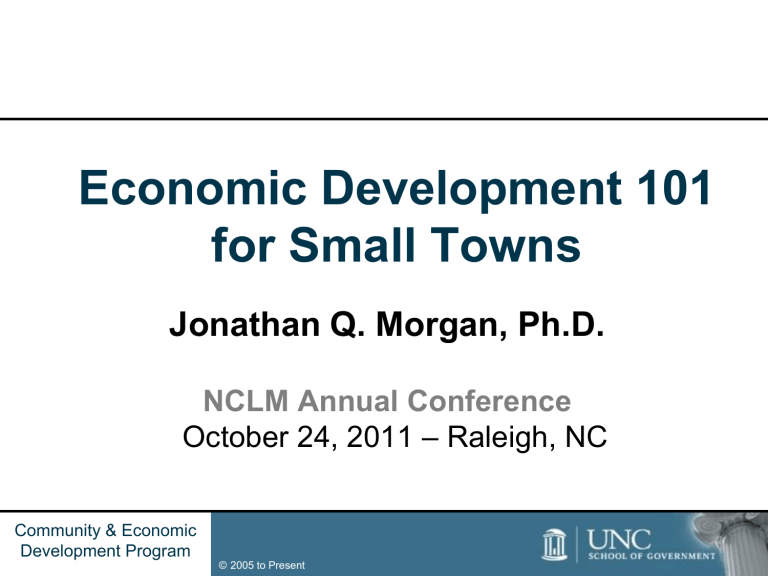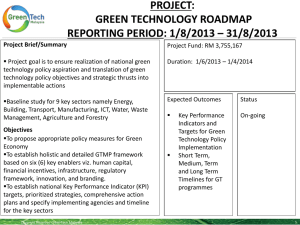2011 Economic Development 101

Economic Development 101 for Small Towns
Jonathan Q. Morgan, Ph.D.
NCLM Annual Conference
October 24, 2011 – Raleigh, NC
Community & Economic
Name of Group
Development Program
© 2005 to Present
Learning Objectives
Understand the process of economic development (ED)
Understand the role of local govt.
Examine ED trends, strategies, and tools
Consider challenges for local governments and small towns
Community & Economic
Name of Group
Development Program
© 2005 to Present
The Process of
Economic Development
Community & Economic
Name of Group
Development Program
© 2005 to Present
Economic Development Goals
• Job creation
• Private investment
• Tax base expansion
• Wealth creation
• Higher quality of life
• Higher standard of living
Community & Economic
Name of Group
Development Program
© 2005 to Present
The ED Process
increased private investment new jobs lower unemployment reduced poverty higher personal incomes increased demand for goods and services government inducements and assistance employment mutiplier
Source: Eisinger, Peter K. 1988. The Rise of the Entrepreneurial State: State and Local Economic
Development Policy in the U.S. University of Wisconsin Press.
Community & Economic
Name of Group
Development Program
© 2005 to Present
What is the single most important role of local govt.?
A.
Provide incentives to businesses when requested.
B.
Create a positive business climate.
C.
Provide strategic leadership and facilitation.
D.
Provide quality services and amenities.
Community & Economic
Name of Group
Development Program
© 2005 to Present
Survey Says…
MOST IMPORTANT ROLE OF LOCAL GOVERNMENT
Provide quality services and amenities 35.9%
Provide strategic leadership/facilitation 31.8
Create a positive business climate 24.9
Offer incentives to companies 4.6
n = 217
Source: Jonathan Q. Morgan, The Role of Local Government in
Economic Development : Survey Findings from North Carolina , UNC
School of Government, 2009.
Community & Economic
Name of Group
Development Program
© 2005 to Present
What Matters to Businesses?
• Sites and Buildings
• Access to Suppliers and Markets
• Workforce/Labor
• Financial Capital
• Regulatory Environment
• Transportation and Utilities
• Incentives
• Taxes
• Quality of Life
Community & Economic
Name of Group
Development Program
© 2005 to Present
What Matters Most for
Manufacturing Firms
1.
2.
3.
4.
5.
6.
7.
8.
9.
10.
Highway accessibility
Labor costs
97.3%
91.0
Tax exemptions 90.9
Occupancy or construction costs 89.8
State and local incentives
Corporate tax rate
89.3
86.3
Availability of skilled labor 85.9
Inbound/outbound shipping costs 84.0
Energy availability and costs 82.1
Availability of buildings 81.0
Source: Area Development, 25 th Annual Corporate Survey, 2010.
Community & Economic
Name of Group
Development Program
© 2005 to Present
What Matters Most:
Quality of Life Factors
1.
Low crime rate
2.
Healthcare facilities
3.
Housing costs
4.
Housing availability
5.
Ratings of public schools
6.
Climate
7.
Colleges and universities
8.
Cultural opportunities
53.2
48.7
9.
Recreational opportunities 48.2
84.6%
72.2
68.4
66.4
61.2
56.3
Community & Economic
Name of Group
Development Program
© 2005 to Present
Incentives
Community & Economic
Name of Group
Development Program
© 2005 to Present
State ED Incentives in NC
Corporate tax credits and exemptions
Grant programs
Industrial revenue bonds (IRB)
Low-interest financing
Infrastructure assistance
Industrial training
Community & Economic
Name of Group
Development Program
© 2005 to Present
Top Local Incentives in NC
Zoning and permit assistance 59.0%
Infrastructure improvements 56.2
Cash grant incentives 42.4
One-stop permitting
State development zone
30.0
24.0
Land or building acquisition
Site preparation
Subsidized land or buildings
23.0
19.4
17.5
Source: J.Q. Morgan, The Role of Local Government in Economic Development :
Survey Findings from North Carolina , UNC School of Government, 2009.
Community & Economic
Name of Group
Development Program
© 2005 to Present
Are ED Incentives Effective?
Not typically the most important factor in location decisions
Can tip the scale in some cases
Do not compensate for major shortcomings in a location
Tend to benefit prosperous communities
Community & Economic
Name of Group
Development Program
© 2005 to Present
Trends in
Economic Development
Community & Economic
Name of Group
Development Program
© 2005 to Present
Evolution of Economic Dev.
Traditional Approach
Industrial recruitment
Cheap labor
Incentives
Individual firms and sectors
Large branch plants
New Approach
Existing industry
Talent and creativity
Targeted incentives
Industry clusters
Entrepreneurship
Regional collaboration
Quality of place
“Green” development
Community & Economic
Name of Group
Development Program
© 2005 to Present
Growth vs. Development
Quantitative:
More
– Jobs
– Businesses
– People
Qualitative:
Better
– High-wage jobs
– Quality of life
– Diversification
– Sustainability
Community & Economic
Name of Group
Development Program
© 2005 to Present
Trends in Economic Dev.
• Strategic focus, targeting, and evaluation of efforts
• Shift from sole emphasis on industrial recruitment
• Alternative ED approaches
Community & Economic
Name of Group
Development Program
© 2005 to Present
Asset-Based Development
• Relates to the local context of a place
• Leverages distinctive community assets
• Strengthens locally to attract externally
Community & Economic
Name of Group
Development Program
© 2005 to Present
Themes of Asset-Based Dev.
• Know your niches
• Build on local strengths
• Grow your own
• Develop people and place
• Look within for economic opportunities
Community & Economic
Name of Group
Development Program
© 2005 to Present
Economic Development
Strategies
Community & Economic
Name of Group
Development Program
© 2005 to Present
Economic Dev. Strategies
1.
Business recruitment/attraction
2.
Business retention/expansion
3.
Business creation (“gardening”)
4.
Creativity and talent cultivation
5.
Place-making
Community & Economic
Name of Group
Development Program
© 2005 to Present
Business Recruitment Basics
• Clearly defined point of contact in the community
• Up-to-date information on the community and its assets
• A “modern” web site
• A targeted marketing strategy
• Connections with regional and state efforts
Community & Economic
Name of Group
Development Program
© 2005 to Present
Top Recruitment Tools in NC
Responding to prospect inquiries 68.7%
Regional partnership 65.4
Partnership with chamber
Website/community profile
59.4
57.1
Building and sites inventory
Provide high quality of life
Cash grant incentives
42.4
41.9
41.5
Source: J.Q. Morgan, The Role of Local Govt. in Economic
Development, UNC School of Government, 2009.
Community & Economic
Name of Group
Development Program
© 2005 to Present
“Product” Development
• Infrastructure
• Land and sites
• Business/industrial parks
• Speculative buildings
• Property rehabilitation and reuse
Community & Economic
Name of Group
Development Program
© 2005 to Present
Partnering on Product Dev.
• Kerr-Tar Industrial Hub project, now called Triangle North
– Network of specialized industrial parks in
Franklin, Granville, Vance, and Warren counties
• North Mecklenburg Industrial Park
– Cornelius, Davidson, and Huntersville
Community & Economic
Name of Group
Development Program
© 2005 to Present
Business Retention
• Formal process for addressing business needs and concerns
• Get businesses involved in the community
• Facilitate collaboration and joint ventures among firms (clusters)
• Recognize and celebrate existing firms
Community & Economic
Name of Group
Development Program
© 2005 to Present
Top Retention Tools in NC
Existing industry calls and visits 48.4%
Business networking 30.9
Cash grant incentives 29.0
Partnering with other local govts. 28.6
Worker training assistance 28.6
Partnering with non-govt. entities 28.6
Surveys of local businesses 24.9
Source: J.Q. Morgan, The Role of Local Govt. in Economic
Development, UNC School of Government, 2009.
Community & Economic
Name of Group
Development Program
© 2005 to Present
Why Business
Retention is Important
• Most significant source of new jobs and investment
• Existing companies contribute to the tax base and employ residents
• Builds the local economy from within
Community & Economic
Name of Group
Development Program
© 2005 to Present
BRE = Business Retention +
Expansion
• Keeping jobs and investment is important
• But so is helping existing firms grow and expand in order to create more jobs and investment
Community & Economic
Name of Group
Development Program
© 2005 to Present
Industry Targeting (Clusters)
Washington, NC (Beaufort County)
• Supporting marine trades and boat building businesses
• Partnered with community college to develop specialized training programs in welding, etc.
• Created incubator to assist small firms that supply boat manufacturers
Community & Economic
Name of Group
Development Program
© 2005 to Present
Business Creation/
“Economic Gardening”
• Entrepreneurship
• Information brokering
• Specialized infrastructure
• Social capital - networking
• Business incubators
Community & Economic
Name of Group
Development Program
© 2005 to Present
Business Creation Basics
• Youth entrepreneurship training (K-12)
• Adult entrepreneurship training
• Networking opportunities
• Mentoring and technical assistance
• Access to financial capital
• Links to higher education and sources of innovation
Community & Economic
Name of Group
Development Program
© 2005 to Present
Top Small Business Tools in NC
Small business development center 27.2%
Business incubator 15.7
Marketing assistance 15.7
Revolving loan fund
Property improvement grants
Microenterprise program
14.7
11.5
9.2
Source: J.Q. Morgan, The Role of Local Govt. in Economic
Development, UNC School of Government, 2009.
Community & Economic
Name of Group
Development Program
© 2005 to Present
An Example: Brevard, NC
• Pop. 6,643; Transylvania County
• Supporting entrepreneurs
• Using local retired business executives to provide consulting and assistance to existing small firms and start-ups
Community & Economic
Name of Group
Development Program
© 2005 to Present
An Example: Dillsboro, NC
• Population 206; Jackson County
• Entrepreneurship support for local artisans
• Using methane gas from the county landfill to power studios for artisans
• Incubator for fledgling artisans
Community & Economic
Name of Group
Development Program
© 2005 to Present
Creativity and Talent Strategies
• Workforce development
• Community amenities
• Arts and culture
• Leadership development
• Social capital
Community & Economic
Name of Group
Development Program
© 2005 to Present
Workforce Development
• Improving K-12 public education
• Meeting skill needs of target industries
• Industry specific training for displaced workers
• Advanced skills for incumbent workers
• Support services like child care, transportation, and career advice
Community & Economic
Name of Group
Development Program
© 2005 to Present
Place-Making
• Quality of life amenities
• Downtown development
• Historic preservation
• Arts and culture
• Tourism development
• Resident and retiree attraction
Community & Economic
Name of Group
Development Program
© 2005 to Present
Place-Making in NC
AYDEN (Pitt County) – Population 4,620
• Comprehensive strategy for downtown revitalization
• Partnered with Main Street Program
• Improved streetscapes and expanded a façade grant program to attract businesses
• Branding: downtown Ayden is “Close to home, close to your heart”.
Community & Economic
Name of Group
Development Program
© 2005 to Present
Place Making in NC
EDENTON (Chowan County) – Pop. 5,394
• Residential development through historic preservation
• Partnered with Preservation NC to transform a blighted cotton mill village
• Used CDBG funds to upgrade water/sewer
• The unique and historic mill homes have attracted artists and entrepreneurs
Community & Economic
Name of Group
Development Program
© 2005 to Present
Strategy Selection
1.
Business recruitment/attraction
2.
Business retention/expansion
3.
Business creation (“gardening”)
4.
Creativity and talent cultivation
5.
Place-making
Community & Economic
Name of Group
Development Program
© 2005 to Present
“Homegrown” Approaches
1.
Place-based Development
2.
Creativity and Talent
Cultivation
3.
Economic Gardening
Community & Economic
Name of Group
Development Program
© 2005 to Present
“Homegrown” Economic Development
Place-making
A. Social capital
Arts and culture
Infrastructure
Economic
Gardening
C
A
D
B
B. Quality of life
Creativity &
Talent Cultivation
C. Entrepreneurial culture and support
D. Human capital
(people)
Challenges for
Small Towns
Community & Economic
Name of Group
Development Program
© 2005 to Present
Top Barriers for Local Govt. in NC
Availability of sites and buildings 60.8%
Lack of infrastructure
Lack of capital/funding
44.2
42.9
Limited no. of major employers 37.3
Lack of skilled workforce 27.6
Inability to retain young people 21.2
Citizen opposition 17.1
Lack of leadership 16.6
Source: J.Q. Morgan, The Role of Local Govt. in Economic Development,
UNC School of Government, 2009.
Community & Economic
Name of Group
Development Program
© 2005 to Present
Challenges for Small Towns
“Old economy” vs. “new economy”
Growth vs. “development”
Residential vs. industrial/commercial development
Commercial property conversion and reuse
Community & Economic
Name of Group
Development Program
© 2005 to Present
Challenges for Small Towns
Building analytical capacity to use incentives wisely
Measuring performance and impacts
Knowing when to collaborate and when to compete
Community & Economic
Name of Group
Development Program
© 2005 to Present
Want to Know More?
• The Role of Local Government in
Economic Development: Survey Findings from NC. UNC School of Govt., 2009.
• Find a Way or Make One: Lessons
Learned from Case Studies of Small Town
Dev., Economic Dev. Journal, 2009.
• Small Towns, Big Ideas. Available at: www.sog.unc.edu/programs/cednc/stbi/
Community & Economic
Name of Group
Development Program
© 2005 to Present
Contact Information
Jonathan Q. Morgan, Ph.D.
UNC School of Government
CB# 3330, Knapp-Sanders Bldg.
Chapel Hill, NC 27599
919-843-0972 morgan@sog.unc.edu
Community & Economic
Name of Group
Development Program
© 2005 to Present











